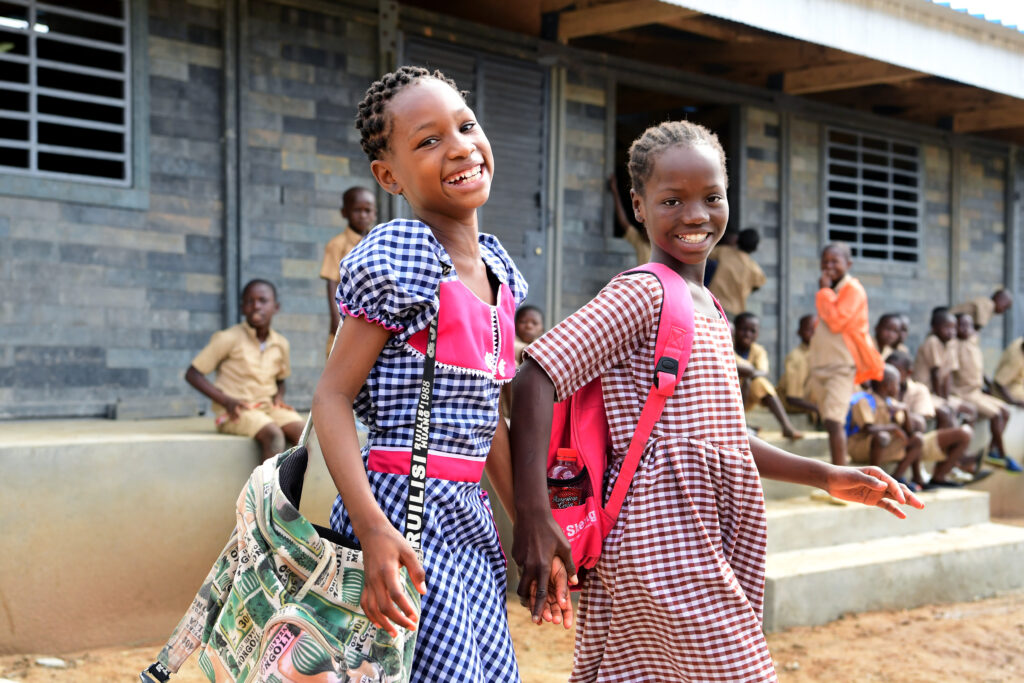Circle K International’s Brick x Brick initiative is helping change lives for families in the African nation of Côte d’Ivoire.
In partnership with UNICEF USA, we are raising money for an innovative project that is transforming plastic waste into classrooms for some of the 1.6 million children who are currently out of school in Côte d’Ivoire.
Through this project, you can be proud to know we will:
UNICEF has partnered with a Colombian family-run social enterprise, Conceptos Plasticos, to create a women-led recycling market. This market will convert Côte d’Ivoire’s plastic waste into safe and durable low-cost building materials.
With the help of CKI and other partners and donors, UNICEF has been able to build 284 classrooms, with another 91 under construction and 98 more planned. These collective efforts from all donors have enabled the total recycling of 2,062 tons of plastic.
It doesn’t stop there. Through your support, teachers will be trained, receive school supplies and have access to improved hygiene and infection prevention and control.
CKI is excited to welcome K-Kids as partners in raising money and awareness for this cause!
Thanks to you, children will grow up healthier and better educated. We hope your club will join in this exciting project.

Children at the playground of their school, made out of recycled plastic bricks, in Youpougon, a suburban of Abidjan, in the South of Côte d’Ivoire. For every child, education. Photo credit: UNICEF
January 23, 2025
January 23, 2025
A staffer with UNICEF USA visits a school in Toumodi-Sakassou, Côte d’Ivoire, to tell CKI members about the work being done with plastic bricks.
Karly Porter with UNICEF USA shares an update on a school made with plastic bricks in Abidjan, Côte d’Ivoire, that provides an education to students who are deaf.
Magda from the Côte d’Ivoire UNICEF office thanks CKI members and gives an update about schools that are being built with plastic bricks.
The money you raise will help support UNICEF to stimulate a recycling economy in Côte d’Ivoire by and for women. The plastic waste they collect will be manufactured into bricks at a Conceptos Plasticos factory in Africa. These bricks will be used to build classrooms for some of the 1.6 million children – mostly girls – who are currently out of school. It doesn’t stop there. You will also help UNICEF train teachers, provide school supplies, and support improved hygiene and infection prevention and control. All of this will have immediate and transformative impact on the lives of children and women in Côte d’Ivoire.
As the WASH project neared its conclusion, the Circle K International Board of Trustees reviewed ideas for our next partnership with UNICEF USA. The Brick x Brick project correlates with three of our existing service initiatives – childhood development, environmental justice and alleviating food insecurity and homelessness – making it a perfect fit.
Located on the southern coast of West Africa between Liberia and Ghana, also referred to as the Ivory Coast, Cote d’Ivoire achieved independence from France in 1960. The country suffered more than a decade of civil conflict that ended in 2011. During this time, many children — especially girls — didn’t have access to education. As of 2015, only 53% of men and 33% of women were literate, contributing to Côte d’Ivoire’s high rates of unskilled labor, adolescent pregnancy and HIV/AIDS. Pollution and improper waste management also contribute to poor health conditions such as malaria, diarrhea and pneumonia, especially among young children.
Côte d’Ivoire is the world’s largest exporter of cocoa beans and is a significant producer of coffee and palm oil, but its dependence on agricultural exports leaves it vulnerable to price fluctuations and climate conditions. Its forests — once the largest in West Africa — have been heavily logged, and the country’s water sources are polluted from sewage and industrial and mining waste. We encourage your club to learn more about Cote d’Ivoire, UNICEF and Conceptos Plasticos through the following articles:
We’re counting on you to spread awareness and raise money! We’ll be rolling out resources, but we want your ideas, too!
Here are some examples of the impact your gift could provide:
The United Nations Children’s Fund (UNICEF) works in more than 190 countries and territories to put children first. UNICEF has helped save more children’s lives than any other humanitarian organization by providing health care and immunizations, clean water and sanitation, nutrition, education, emergency relief and more.
UNICEF USA advances the global mission of UNICEF by rallying the American public to support the world’s most vulnerable children. UNICEF USA’s mission is to relentlessly pursue an equitable world for every child.